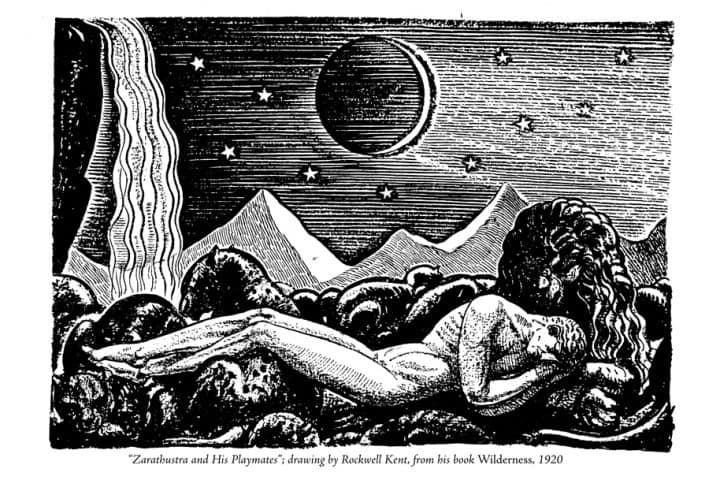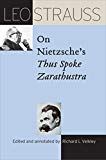Books Reviewed
In Leo Strauss on Nietzsche’s Thus Spoke Zarathustra, the greatest philosopher of the 20th century shares his thoughts on the greatest philosopher of the 19th. What makes this book-length reflection by Leo Strauss on Friedrich Nietzsche’s Thus Spoke Zarathustra—the book Nietzsche considered his best—all the more important is that Strauss published next to nothing on Nietzsche. The absence of publication does not mean the absence of engagement. As the editor, Richard L. Velkley of Tulane University, observes, “Leo Strauss had a special relation to Nietzsche’s philosophy from his earliest years,” and he lectured on Nietzsche to the end of his life. This volume, however, is his only sustained treatment of Zarathustra.
This is the first in a series of books to be published by the Leo Strauss Center at the University of Chicago. Over the past decade, under the directorship of Nathan Tarcov, the Strauss Center has edited and published online more than three dozen transcripts or audio files of lectures or courses Strauss gave from 1957 to 1973. Uncorrected transcripts have circulated among his students and students-of-students for years. This project brings these hidden but not forgotten writings into the light.
* * *
Leo Strauss on Nietzsche’s Thus Spoke Zarathustra includes 14 graduate seminar lectures Strauss gave at the University of Chicago in 1959. The format is not ideal: Strauss never meant these lectures to be published, they are far from polished, and the original audio recordings are long lost. This edition is based on a transcript by persons unknown—a transcript that often notes the tapes were inaudible. In the case of the fifth lecture the transcript itself is missing, replaced here by Werner Dannhauser’s class notes. As a result, the text harbors many incomplete or unintelligible lines, and perhaps many subtle and misleading errors.
Notwithstanding these difficulties, it is a deeply rewarding work. Part of the reward comes in the picture it offers of Strauss as a teacher. The course is a shining example of true freedom of thought. Only 14 years after the Nazi regime’s full horrors had come to light, Strauss could have turned his back on Nietzsche, who wrote in Zarathustra: “Blood is spirit.” “War and courage have accomplished more great things than love of the neighbor.” “All-too-many live, and all-too-long they hang on their branches. Would that a storm came to shake all this worm-eaten rot from the tree!” “For, to me justice speaks thus: ‘Men are not equal.’” Yet Strauss did not. Nor does he sugarcoat his subject. He states quite firmly, “Nietzsche had made impossible, especially in Germany, the acceptance of liberal democracy and socialism,” and, “one cannot for one moment overlook the fact, or minimize it, that Nietzsche’s doctrine was with a kind of inevitability corrupted into fascism.” “If I respect the man,” Strauss adds, “I respect him for what he was and not as a figment of my imagination.”
In addition to this freedom of thought, Strauss demonstrates a relentless desire for clarity. He begins by admitting that Zarathustra, which Nietzsche wrote in 40 days, is a “work of inspiration,” “very hard to understand,” and, “in a way unintelligible without the assistance of Nietzsche’s other writings.” Yet he seeks to understand it and to share his understanding as clearly as possible, making, for example, at least a half-dozen attempts to explain Nietzsche’s doctrine of the eternal return. He readily admits the limits of his comprehension. His intellectual honesty is a model for any serious teacher.
* * *
Strauss begins where Nietzsche does. Nietzsche faces the problem of “the death of God”—of the demise of any objective ground for claims of right. Very importantly, Nietzsche argues, this demise is the very conclusion of the modern natural right tradition, which Strauss helpfully reviews in the first two lectures to illustrate Nietzsche’s point. But Nietzsche does not celebrate this death. It is instead a potential catastrophe, posing the greatest danger: the complete degradation of mankind. Since there is no objective ground for right, all lofty or noble values—“Excel above all others,” “Always tell the truth,” “Honor thy mother and thy father,” “Practice loyalty, even for dangerous things”—look absurd. Low, selfish desires are no more “right” than high ones, but they are solid. The way is prepared to the Last Man.
Regarding the “death of God,” Nietzsche couldn’t be further from his fans on the Left today, who parrot his words as justification for equality. They ignore the mortal blow the “death of God” poses to Progressivism, the belief that the arc of history bends toward justice or some other transcendent good. In contrast, some on the Right embrace Nietzsche’s critique of the Last Man. But few take the next step and celebrate his “project” of the Superman.
Strauss gives special attention to the most distinctive character of Nietzsche’s thought: his insistence on rank. The crisis before us is the choice between the Last Man (low) and the Superman (high). This choice is presaged in the divide between the “higher men” (e.g., scientists, poets, nihilists) and “small men” (e.g., utilitarians and rabbit-like liberals).
On what basis does Nietzsche posit this hierarchy? Not history. Our historical sense repudiates attempts to masquerade as ancient Greeks, Scythians, Jews, or the like. Not reason or science. Our “science” is itself value-ridden, shot through with decayed Christianity: what Nietzsche mocks as the “Immaculate Perception.” It leads to sterility, not creativity, to alienation from this world, and ultimately to nihilism. (Why choose science? There is no “scientific” answer.)
Nietzsche’s recourse is will: man must create, not find, a new hierarchy. But this creation rests on a different foundation than past creations, on the objective truth that all truth is subjective. Strauss calls this teaching “paradoxical”—offensive to common opinion—but not contradictory. Why not?
* * *
Strauss emphasizes that Nietzsche’s will is both creative and contemplative. It is contemplative in facing the “eternal return of the same.” This is no noble lie for Nietzsche. His cosmological studies convinced him that the universe is finite. All events—all the stupid “facts” and deformities of life, as well as all beautiful and fragile things—recur infinitely. Contemplating this return may seem the very essence of pessimism. There will never be anything new or better. But such pessimism rests on the assumption that life depends on novelty or progress.
The creative will, instead, affirms the eternal return. It endows this moment—meaningless in itself—with infinite responsibility. It does not long for some “other world” but remains “loyal to the earth.” Willing the eternal return is central to Nietzsche’s teaching, not the easily-dismissed oddity of an unstable mind.
In attempting to make sense of this paradoxical core of Nietzsche’s thought, Strauss points to the importance of lightness. Lightness is not just a matter of style for Nietzsche. Zarathustra’s lightness is most obviously seen in his songs, dreams, and, as Strauss emphasizes, his “enigmatic visions.” The most famous of these center around the eternal return. Nietzsche appears to treat these visions—not arguments—as the most natural starting points or touchstones for thinking. Is this a dangerous teaching? Of course!
But the importance of visions suggests lightness may be key to understanding Nietzsche’s cosmology. The eternal return can seem hubristic, as can Zarathustra’s repeated calls for taking responsibility for eternity. Remembering that this “doctrine”—even the entire book—is “inspired” helps dispel this haughtiness, as does recognizing that it is moralistic to call responsibility “heavy.” Rather, taking responsibility for this moment is the lightening response to the sickness, the resentment, of feeling that nothing really matters.
Strauss connects Nietzsche’s “enigmatic visions” to “the enigmatic character of the whole.” In talking of dreams and visions Nietzsche is not being fanciful or whistling past the graveyard. “What is”—or “what becomes”—appears to us in visions and dreams, in this light way. It interjects this lightness. The character of the whole is enigmatic not because we’ve not yet figured it out but because there is no “figuring” it out. And yet it is not “completely enigmatic.” As enigmatic it is riddling—it invites our inquiry. There is some kinship between us and the whole. We can’t know everything, but we don’t know nothing.
* * *
This language about the whole is the same Strauss uses when discussing Plato. Was Plato really so different on the central question of the character of the whole? (This question precedes the question, “What is the whole?,” for we cannot assume that the whole is intelligible.) In these lectures Strauss emphasizes the difference, stressing Plato’s rationalism and understating his eros (or at least treating eros as secondary to the “preexistent” or “permanent” ideas for which it longs). Is he here expounding Nietzsche’s view or stating his own? This is a question worth further consideration.
Strauss dwells in these lectures on the dialogue between Plato and Nietzsche. Though many thinkers receive more attention from Strauss in print, I believe he considered Plato and Nietzsche the two most worthy of serious attention. This elevation of Nietzsche complicates the conventional “Straussian” history of philosophy: e.g., the famous “classical” versus “modern” divide, and the account of modernity’s “three waves.” Perhaps Plato and Nietzsche are not as radically different as “classical” versus “modern” would suggest? Nietzsche’s “third wave” certainly seems to swamp the prior two.
Incidentally, Strauss here hints that by abandoning the “cosmological problem” and being satisfied with the “answer” that man’s origin is a “mystery,” Martin Heidegger falls short of Nietzsche. These lectures thus shed important light on Strauss’s rare—and daring—praise of Heidegger in his “Existentialism” lecture (1956). As Strauss says in that lecture, it may be a “long time” before Nietzsche’s work is understood. A great obstacle to that understanding is that Nietzsche has gone from being considered “fundamentally unsound” (as P.G. Wodehouse’s Jeeves calls him) to being considered conventional: he is no doubt important, but not so important as to keep one up at night. Strauss’s lectures serve to militate against that fate.
The understanding of Strauss’s own thoughts may lie at the end of a similarly long road. For those traveling in that direction, this volume is a most welcome companion.




